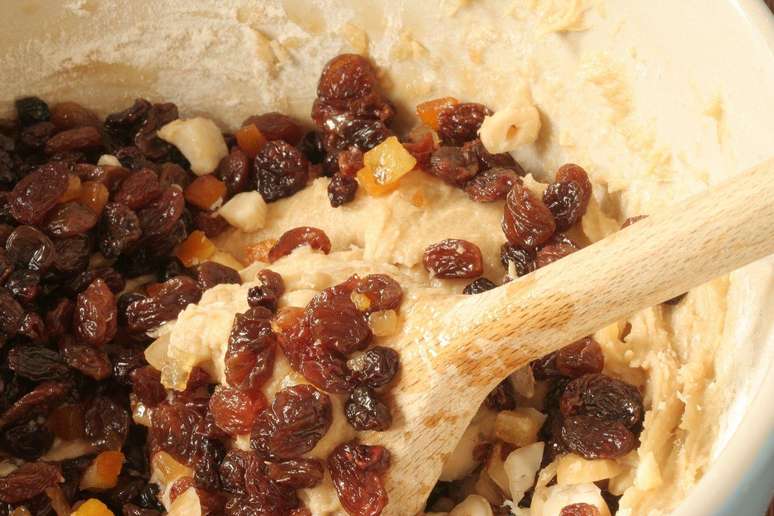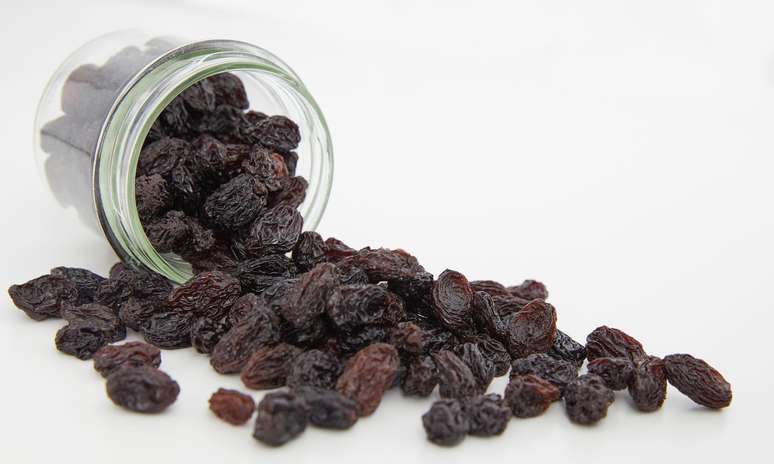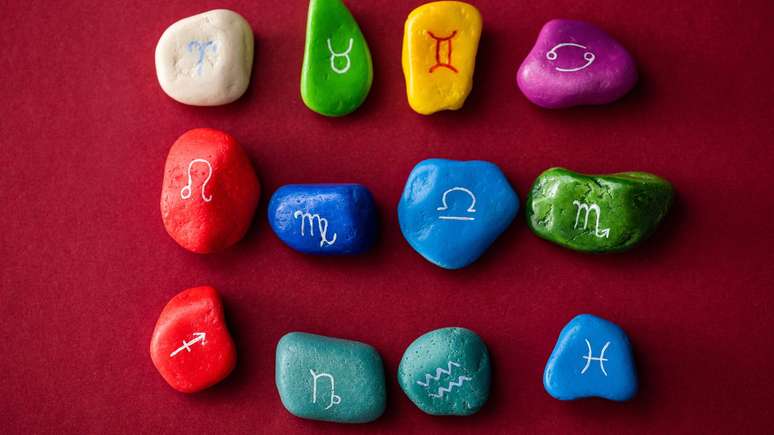You may not like it, but raisins have made history because they are nutritious, easy to transport and store.
It is a gastronomic ideological polarization that always occurs in the month of December: after all, will dinner be with raisins or without raisins?
On the one hand there are those who hate it and prefer to sit at the table with their uncle who votes for the opposite political party rather than eat anything with fruit; on the other, those who cannot imagine the pomp and solemnity of Christmas and New Year without the complement.
Because the history of food is as long as it is rich in interpretations. Raisins are mentioned in texts from the Old Testament of the Bible, which leads us to believe that they were consumed at least 4 thousand years ago.
In short, the dehydrated fruit proposal makes perfect sense, especially in a pre-refrigerator world. It was a way to preserve food for months and have it available even during the harsh winter months.
According to gastronome and historian Camila Landi, professor and coordinator of the Gastronomic Technology course at the Universidade Presbiteriana Mackenzie, the evidence suggests that raisin consumption began as a matter of survival, in ancient times.
“Seeds and fruits fallen from trees and dried naturally [serviam de alimento]”, he explains to BBC News Brasil.
“Throughout the history of food, through human observation, it becomes the result of a natural preservation method, which occurs through the natural dehydration of the ingredient,” explains Landi.
Gastrologist Karyna Muniz, a food and drink consultant, agrees that, like much of the history of food, this consumption began accidentally, by observing grapes “falling from the trees and drying naturally in the sun.”
But the taste was pleasant.
“And after the discovery of an intense flavor and a specific sweetness, they began to be widely consumed during Ancient Rome,” says Muniz.
Energy for the winter
And if the need for a food like raisins was even greater in the intense winters of the Northern Hemisphere, it is not difficult to understand why the delicacy has become common on the tables during the end-of-year holidays, whether they already occurred before the era Christian, were the celebrations of Christmas.
“The origin of consumption is due to the winter solstice in the Northern Hemisphere, which led to the need to consume and preserve products with a longer shelf life,” says Muniz. “Hence the preference for oily seeds, such as nuts, and nuts, dehydrated or dried, as well as sausages, among others.”

Camila Landi underlines that food has ended up acquiring new meanings.
“It arrived all over the world with the same symbolism of the time: the promise to people of a new cycle of transformations, prosperity and abundance”, underlines the historian.
The oldest evidence of raisins appears in the collection of ancient writings that gave rise to the Bible, a book considered sacred by most civilizations.
In the Bible, a food linked to sex
Raisins are mentioned quite frequently in the Old Testament.
According to the theologian and historian Gérson Leite de Moraes, professor at the Universidade Presbiteriana Mackenzie, these quotes can be divided into two types, considering the meaning of the passages.
There are passages that associate raisins with erotic aspects and others that enhance food as something practical, nutritious and easy to transport and store.
“When it comes to sexuality, there are positive and negative aspects,” he explains in a conversation with BBC News Brasil. “In the book Song of Songs, [a uva-passa] appears in a poem written by his wife to her lover.”
The song praises her husband, saying that “his fruit is sweet to my taste.” And after underlining that she “makes me enter the tavern, her banner over me is love”, the lyrical ego asks his beloved to do it again “with raisin focaccias” because she is “sick of Love”.
Another passage of a sexual nature is in the book of Hosea, when God rebukes those who “turn to other gods” by engaging in prostitution and adultery. In the text, these “like raisin cakes.”
As Moraes explains, “the presence of apples and raisins in the context of sexual intercourse attracts attention, because they are two foods associated with the aphrodisiac issue.”
The theologian recalls that in ancient pagan rites a cake with raisins was offered to the goddess of fertility.
“The difference between the two passages is that in the first the aphrodisiac context is within a marriage approved in the eyes of God; in the second it is a relationship of promiscuity, prostitution, that is, food is associated with an environment of adultery”, compare .

Storage and transportation
Another aspect of raisins that stands out in biblical texts is their usefulness.
“It was an easy-to-carry food, a favorite of travelers in those ancient times. Raisins are repeatedly spoken of as an essential ingredient for long journeys,” Moraes points out.
In the first book of Samuel, for example, there is a description of how the character Abigail prepared everything for a long journey. And it is said that she “at once took two hundred loaves of bread, two skins of wine, five ready-made sheep, five measures of toasted corn, one hundred bunches of raisins, and two hundred fig cakes.”
“It was a simple, sun-dried food, and once dehydrated, it was easy to handle and store,” says Moraes. “Nutritious, healthy.”
And, given the concentration of sugars, the food energized travelers, who often spent long journeys without anything to eat.
In the book of Samuel, halfway through the journey, the caravan meets an Egyptian who was “out of breath, because for three days and three nights he had not eaten or drunk anything”.
“They gave him bread to eat and water to drink. They also gave him a fig cake and two bunches of raisins”, says the biblical text.
But despite having an important utilitarian value, raisins were not relegated only to this common use: there is also evidence that they were fruits appreciated in celebrations.
In the first book of Chronicles, when there is the story of the proclamation of David king of Israel, it is said that those who had gone to recognize him «remained there with David three days, eating and drinking, because his brothers had made preparations for They” .
Subsequently it is specified that “they brought food to the donkeys and camels, to the mules and to the oxen: flour, crushed figs and raisins, wine, hatchet, oxen and sheep in abundance, because there was joy in Israel”.
Moraes cites the contexts in which raisins usually appear in the Bible.
“In general, we can say that raisins in the Bible appear in very specific contexts, of travel and celebrations, and also of heightened sexuality, in the aphrodisiac context,” he summarizes.
The historian Landi adds that grapes “are an element present in numerous hospitality rites in ancient societies, such as the Mesopotamian, Egyptian, Jewish, Greek and Roman ones”.
The fruit is a constant at banquets and meetings, “with evidence of its consumption and food symbolism linked to abundance, fertility and prosperity”.
Benefits: libido and general health
But the symbolic charge is not accidental. By analyzing the properties of food, all this semantics finds meaning. First: the idea of concentrating sugar and rich nutrients in a small food, easily transportable and storable.
“When we dehydrate a grape, or another ingredient, we preserve its natural sugars and remove its moisture, making it even sweeter, concentrated in flavors and nutrients,” explains Landi. “There are those who appreciate it and those who hate it. The fact is that this element was a conservation method to avoid the scarcity of available food and, moreover, it was a source of energy for humans.”
Today, raisins are known to provide numerous health benefits.
According to Muniz it is considered a superfood, “with nutritional and vital benefits for the health of the body and mind”.
He claims that raisins help with intestinal regulation, as they are rich in fiber. They also act to strengthen the immune system, because they contain B complex vitamins, as well as minerals such as iron.
They are beneficial for the heart, because “they are rich in antioxidants effective in eliminating cholesterol and cleaning the arteries”. These antioxidants also act against free radicals and help prevent the onset of tumors.
According to the expert, raisins also have anti-inflammatory properties, contribute to oral health, regulate the body’s acidity and, since they contain potassium, strengthen the muscles and the nervous system.
Finally, a possible explanation of the aphrodisiac use that appears in the Bible.
“It gives energy: fructose increases energy levels, increasing physical performance in daily activities,” he comments.
And not only. Today it is known that raisins contain arginine, “an amino acid important for stimulating libido”.
So it’s Christmas: with raisins or without raisins?
Let’s go back to Christmas lunch. By now you already know: Like it or not, the ancient custom in the Northern Hemisphere, especially in the Mediterranean and Mesopotamian regions, has been incorporated into Brazil’s holiday celebrations.
“It is important to say that the consumption of raisins in food occurs in many foods around the world. Historically, it is used in savory and sweet recipes in different parts of the world,” emphasizes the writer and food journalist Rafael Tonon, author of the book Food revolutions and coordinator of the master’s degree in Journalism and Gastronomic Communication at the BasqueCulinary Center, in the Basque region of Spain.
He explains that the festive charm that the ingredient has acquired on the Brazilian table is precisely due to the fact that its use is not trivial.
“For Brazilians it has become a sporadic thing. And since Christmas requires a circumstance, a certain pomp, it appears at this moment,” says Tonon.
Before arguing, Muniz pays attention to the fact that “we must understand that taste is something particular and individual”.
But he attributes the bad reputation of Christmas raisins to exaggeration, as he sees “excessive use in multiple preparations at the same time in a single night.”
“They are in the farofa, in the rice, in the sausage, in the salad…”, he lists.
Technically, what affects the color of raisins – dark or golden – is the dehydration process and not the type of grape.
Nowadays, they are often made with Thompson or Moscato grapes.
According to the expert, these two varieties are ideal for this process, because they have “thin skin, firm pulp and a high sugar content”.
“They are generally produced from fresh grapes classified as ‘fine table grapes’ that do not meet acceptable standards for retail sale,” comments Muniz.
“The brown ones, most of the time, dry out in the sun, and this dark color is the result of sunburn, so to speak,” Tonon says. “The sea bream is dried in a dryer, at a controlled temperature. This means that it can be dried with a more specific process, which does not alter its colour.”
Source: Terra
Ben Stock is a lifestyle journalist and author at Gossipify. He writes about topics such as health, wellness, travel, food and home decor. He provides practical advice and inspiration to improve well-being, keeps readers up to date with latest lifestyle news and trends, known for his engaging writing style, in-depth analysis and unique perspectives.








